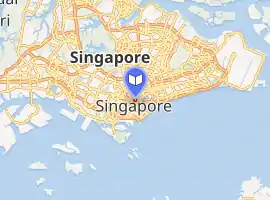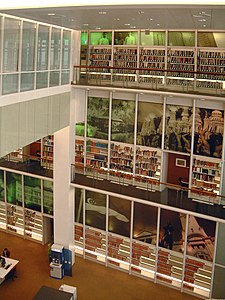National Library, Singapore
The National Library, Singapore is the flagship national library of Singapore. A subsidiary of the National Library Board (NLB), it is located on an 11,304–square metre site in Victoria Street within the Downtown Core. It is the country's largest public library.[3]
 The National Library in Victoria Street, Singapore | |
| Country | Singapore |
|---|---|
| Type | Public library |
| Established | 1823[1] |
| Location | 100 Victoria Street, Singapore 188064 |
| Branch of | National Library Board |
| Other information | |
| Director | Ng Cher Pong, CEO Lee Seow Hiang, Chairman[2] |
| Website | www |
| Map | |

| |
| National Library, Singapore | |||||||
|---|---|---|---|---|---|---|---|
| Chinese name | |||||||
| Chinese | 国家图书馆 | ||||||
| |||||||
| Malay name | |||||||
| Malay | Perpustakaan Negara | ||||||
| Tamil name | |||||||
| Tamil | தேசிய நூலகம் | ||||||
The library has regional branches throughout the city-state such as in Jurong, Tampines and Woodlands as well as affiliations with academic and professional libraries. The branch libraries are open to the general public and consist of circulating libraries. The National Library also consists of research libraries, which are also open to the general public.
History
The National Library traces its history back to 1823 with the establishment of the first national public library as suggested by Stamford Raffles, the founder of modern Singapore. It was renamed the Hullett Memorial Library in 1923, co-located with Singapore's first school, Raffles Institution, at a site now occupied by the Raffles City complex.[4] It moved to a separate Library and Museum Building in 1887 under the name of Raffles Library as part of the Raffles Museum, before moving to the Stamford Road premises in 1960 under the name of the National Library of Singapore where it was opened by Yusof Ishak, the first President of Singapore.
Lee Kong Chian Reference Library
Previously known as the National Reference Library, the Lee Kong Chian Reference Library adopted its new name after receiving a S$60 million donation from the Lee Foundation, founded by Dr Lee Kong Chian. It occupies 7 storeys (Levels 7-13) at the National Library Building with a floor area of 14,265 square metres.[5] It has a start-up collection of 530,000 print and non-print materials. The Library provides reference services onsite, or via email, sms, telephone and fax. It has a full range of facilities such as access to electronic databases, document delivery service, microfilm, reprography and audio-visual are available. Other facilities at the library include wireless access to the Internet, as well as the use of reading and meeting rooms. Materials from this library cannot be borrowed, but may be consulted on-site.
Current building
The current building, a 16-storey, two-block development situated in the city's Civic District, replaces the old National Library at Stamford Road, which closed on 31 March 2004.[6]
The library moved to its new home on 22 July 2005, and was officially opened on 12 November that year by the then President S. R. Nathan. It is the flagship building of the National Library Board, bringing together the core functions of the old library by incorporating a reference library, known as the Lee Kong Chian Reference Library (simplified Chinese: 李光前参考图书馆; traditional Chinese: 李光前參考圖書館), as well as a public library, the Central Public Library, under one roof.
The building was designed by T.R. Hamzah & Ken Yeang[7] consists of two 16-storey blocks, with three basements. The blocks are linked by skybridges on every floor. It houses two libraries, the Central Public Library in Basement 1 and the Lee Kong Chian Reference Library from Levels 7 to 13. It also houses the Drama Centre from Levels 3 to 5, which is managed by the National Arts Council. The National Library Board (NLB) headquarters is located on the 14th floor.
On the highest 16th level rooftop, there is a large closed area designed like a bubble called The Pod, used for functions and events. Although not a public viewing gallery, it has a panoramic 360-degree view of the city core and Marina bay area. The plaza on the ground floor has a cafe and is often used as an exhibition space. There are many gardens in the building but only two are opened to the public - the Courtyard on Level 5 and the Retreat on Level 10. There are three glass elevators for public use. There are escalators on every floor, from Basement 3 to level 14th. The basement carpark has 246 lots. A number of old bricks from the old National Library building has been incorporated into the present building.
Sections
The main collections found at each level of the Lee Kong Chian Reference Library includes:[8]
- Level 7 – Business, Science and Technology Collections
- Level 8 – The Arts and Social Sciences Collections
- Level 9 – Chinese, Malay and Tamil Collection
- Level 10 – Donors' Collections, Asian Children's Collection
- Level 11 – Singapore and Southeast Asian Collection. Microfilms. Maps.
- Levels 12 and 13 – Rare Materials Collection (limited access, only with permission)
Gallery
 Singapore and Asian Collection, Lee Kong Chian Reference Library
Singapore and Asian Collection, Lee Kong Chian Reference Library Entrance to the National Library
Entrance to the National Library National Library Building's "The Retreat"
National Library Building's "The Retreat"
See also
References
Notes
- "History of National Library Singapore". nlb.gov.sg. Retrieved 11 November 2020.
- "New Chairman and Chief Executive Officer to be appointed to the National Library Board". mci.gov.sg. Retrieved 11 November 2020.
- "National Library Board > About > History of National Library Singapore". www.nlb.gov.sg. Retrieved 11 February 2018.
- "History of National Library Singapore". National Library Board Singapore. Retrieved 17 May 2014.
- "National Library Board > About > Lee Kong Chian Reference Library". www.nlb.gov.sg. Retrieved 11 February 2018.
- "Archived copy". Archived from the original on 16 January 2010. Retrieved 2 July 2013.CS1 maint: archived copy as title (link)
- Pearson, Clifford A.: "T.R. Hamzah & Yeang applies its trademark bioclimatic design principles to the new National Library in Singapore" in Architectural Record, August 2006
- "Accessing Lee Kong Chian Reference Library's Resources". www.nl.sg. Archived from the original on 18 April 2013. Retrieved 14 August 2012.
External links
| Wikimedia Commons has media related to National Library, Singapore. |